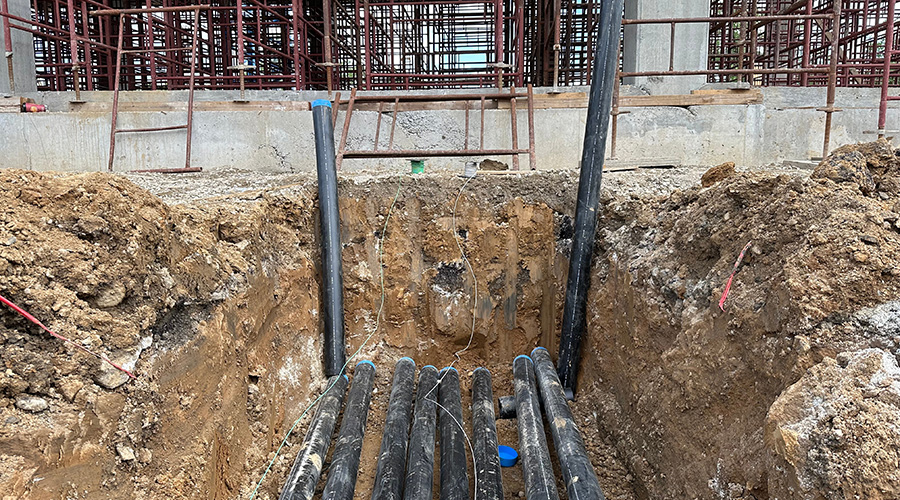Understanding the Role of Technicians in Facilities Management Success
Michael Terrell had relied on technicians’ experience in his facilities management career.
By Dan Hounsell, Senior Editor
The career of Michael Terrell, senior director of operations with Liberty University, has taken him from industrial engineering and nuclear power plants to facilities management in higher education.
FacilitiesNet: What did you think you'd do for a living when you entered the workforce?
Michael Terrell: I graduated from North Carolina State University with a bachelor’s degree in engineering operations. I chose that degree even though it was part of the industrial engineering school because it provided an overview of all the engineering disciplines except nuclear and it included business management courses. I entered the workforce in 1977, at Duke Power (now Duke Energy) as a buyer in the purchasing department supporting nuclear power plants.
After three years, I joined the nuclear projects and licensing department as a technical specialist managing projects. I was already studying to get my master’s in business administration (MBA), but because my degree did not get accredited, I could not be called an engineer, so I dropped the pursuit of an MBA and started studying for my Professional Engineers (P.E.) certification. Four years later, I passed the P.E. exam and was officially an engineer.
But I was not doing engineering work. I was managing projects. So I decided to get certified as a project management professional by the Project Management Institute. Now, 47 years into my career, even as the senior director of facilities operations at Liberty University, I am still managing projects.
FacilitiesNet: What was your first facilities-related job?
Terrell: When most people think about facilities management, they think of maintenance. But facilities management is so much more. According to the International Organization for Standardization, “Facility or facilities management is a profession dedicated to supporting people. It ensures the functionality, comfort, safety, sustainability and efficiency of the built environment — the buildings we live and work in and their surrounding infrastructure.”
According to the International Facilities Management Association, “This combination of job responsibilities supports the operations of each organization to create an environment where the systems work together seamlessly, from the parking lot to the executive suite. Facility managers are the people who make sure we have the safest and best experience possible, by coordinating the processes that make the built environment succeed.”
Looking back, most of my career has been facilities management-related. My first facilities-related job was in 1980 as a project manager supporting facilities modifications to Duke Power’s Oconee Nuclear Station. From the design to construction to operations, modifications and decommissioning of facilities, I have been involved in facility management. I just did not know it. My first formal facilities-related job came in August 2021, when I became the senior director of operations for the facilities management division at Liberty University.
FacilitiesNet: What have been your biggest challenges in facilities management?
Terrell: Shifting from a projects-based approach to an operations-based focus has been the biggest challenge of my new role as the senior director of operations. This involves focusing on operational stability, efficient operations and continuous improvement. According to the Project Management Institute, “Project management is the application of knowledge, skills, tools, and techniques to project activities to meet project requirements. It’s the practice of planning, organizing, and executing the tasks needed to turn a brilliant idea into a tangible product, service, or deliverable. Consequently, project managers are focused on defining and managing scope for their projects, change management, and return on investment as they build, modify, or even decommission facilities.”
FacilitiesNet: What have been your biggest surprises in facilities management?
Terrell: Besides learning that facilities management is more than doing maintenance on equipment, my biggest surprise has been how difficult it can be to implement change. Even when the people you are working with agree the change will be beneficial, there is a reluctance to disrupt the status quo. Coming from a project management background, I was put in charge of projects that had already been approved, so it was my job to implement the desired change. In my current role, selling the improvement idea is the focus and that involves bringing people onboard with change.
FacilitiesNet: What do you wish you had known when starting in the profession?
Terrell: The first six weeks of my career, my boss sent me to spend one week at six of Duke’s power plants to get to know some of the people with whom I would be working. This was very valuable establishing working relationships. When I got to Liberty University, my boss told me to take time to get to know the facilities, which I did. I think it would have been better to get to know the facilities and grounds technicians and spend time with them as they performed their duties to get to know the facilities.
FacilitiesNet: What advice would you give to a person entering facilities management?
Terrell: First, consider trade school if you want to do wrench-turning activities. College degrees are good, but my first boss told me something I will never forget that I try to pass on to others: “Your degree tells me that you can be trained to do the job I am asking you to do, and you have the tenacity to stick to it.”
Second, once in the job, get to know your technicians, and spend time in the field with them. They have a wealth of knowledge and ideas. We need to get that knowledge out of their heads and into a computerized maintenance management system or integrated workplace management system so it becomes institutional knowledge before it is lost to retirements.
Third, get to know your customers. They are the reason you are there.
Dan Hounsell is senior editor for the facilities market. He has more than 30 years of experience writing about facilities maintenance, engineering and management.
Related Topics:












